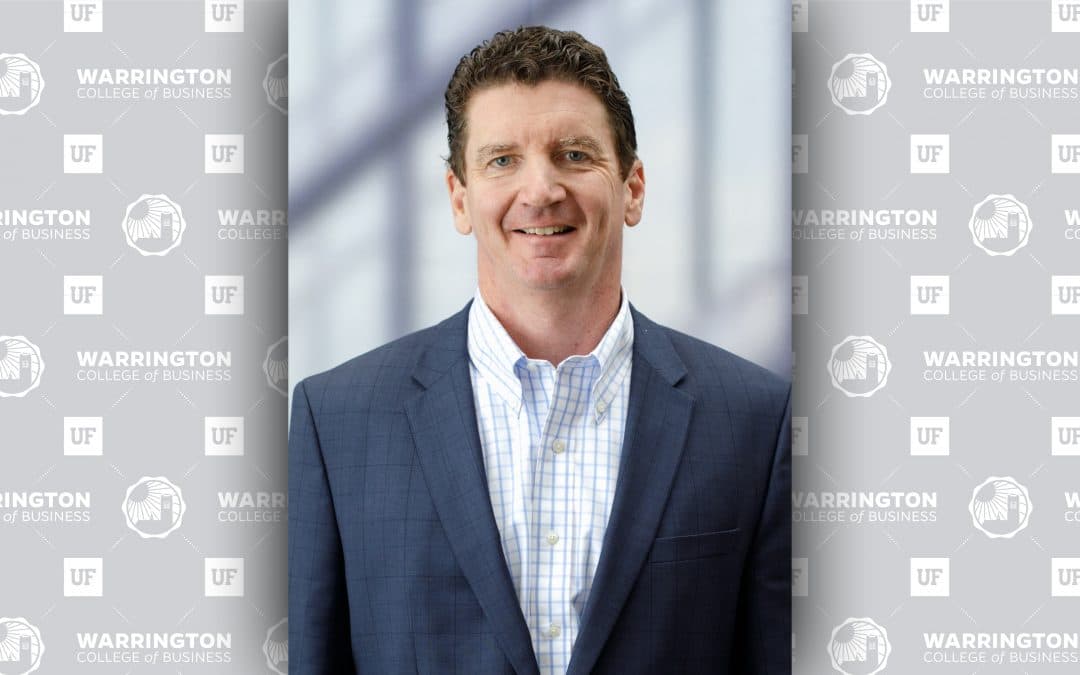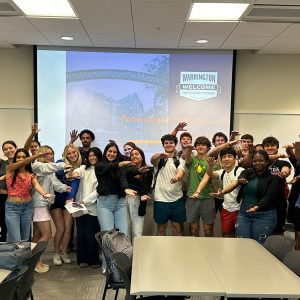Warrington alumnus a long-term asset for JPMorgan
22-year private equity veteran Rob Cousin shares how the industry grew and insights for investors.
Rob Cousin knew early in his life that finance was the career path he wanted to follow. His finance education began with his undergraduate degree in economics from Tulane University and continued with an MBA, concentrated in finance, from the University of Florida.
While finance was the industry Cousin (MBA ’95) was drawn to, he never would have guessed that the private equity sector was where he’d end up.
Cousin earned his degree in the UF MBA Full-Time program, which he described as a program with a great reputation and small cohort size, a status it still has today. The small classes gave Cousin the opportunity to get to know all of his classmates and professors, and ultimately, gain the education he needed to be successful in the finance industry.
After earning his MBA in 1995, Cousin started on his career path at AT&T helping to manage investments for the company’s pension fund. Three years into his role, AT&T outsourced the pension fund management team to JPMorgan, and with it, Cousin moved to the company he’s now been with for 22 years.
As one of the eight original members of the JPMorgan Asset Management Private Equity Group, Cousin is proud to have helped take the business from startup level to $24 billion in assets under management today. The Managing Director also notes that with the move from AT&T to JPMorgan, he cemented his place in the then-growing private equity sector.
“At the time, private equity was a small, cottage industry,” Cousin said. “Today, it’s much more mainstream. I was very fortunate to have, somewhat happenstance, ended up being in an industry that took off.”
In his role, Cousin works with clients managing their investments, from investing in funds to directly in companies, globally. What Cousin finds most interesting about his role in private equity, and why he recommends students and young professionals learn about the industry, is that the private markets represent such a large portion of the potential investment opportunity set.
“The public stock market has only a few thousand companies, but there are hundreds of thousands of companies that are private,” Cousin said. “These include family-run companies in virtually every sector that one could say represent an investment opportunity for a private equity investor. Many of the major innovative companies that gain notoriety and end up doing well, like Google then and Uber now, all start out as private.
“It’s almost that you need to be familiar with private equity in order to be successful in investing because so much comes out of the private realm.”
Cousin’s familiarity with the private equity market benefits more than just his clients. As a member of the UF Investment Corporation (UFICO) board, Cousin’s insights are valuable to the university’s investment strategy.
As a board member, and upcoming board Vice Chairman, Cousin and his fellow board members meet regularly with the UFICO staff to help set investment strategy and policy, while also providing counsel on potential investment ideas and the ever-changing market environment.
“Being on the UFICO board is one of the most rewarding things I’ve done professionally,” he said. “It’s allowed me to share some of my knowledge and experience while doing something to support the university. It’s so interesting to observe how the relatively small staff manages the various pools of capital supporting UF.
“I also value hearing from other board members who are senior professionals throughout the investment management industry or at the university. I feel like I gain more from them than they do from me.”
While Cousin gives back to the UFICO board with his time, he personally invests in students through the Gator Student Investment Fund (GSIF), Warrington’s student managed investment fund that provides members with a realistic asset management experience.
Early on in Cousin’s involvement with GSIF, he met with some of the senior students running the fund and was immediately impressed with their work.
“I was floored by their rigor, analysis and clear teamwork to manage the fund,” he said. “[GSIF] teaches them leadership and management of teams and people in addition to managing the fund. As I’ve gotten more involved, the thing that impresses me the most is how sharp and well balanced they are. I would put them up with anyone I come across in the asset management space.”
In addition to GSIF being a fantastic financial and experiential learning opportunity for students, it shares a portion of its returns with the Machen Florida Opportunity Scholars program, which pursues the primary goal of graduating first-generation, low-income undergraduate students. For Cousin, that combination was a homerun.
“I was in a situation where I had financial support in my college years, so it’s very important to me to help students in the same way,” he said. “With GSIF giving back to the Machen program, it’s the perfect combination of my interest in finance and giving back to low-income students.”




